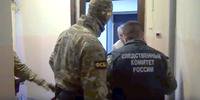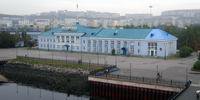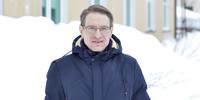Case of Omelchenko in Murmansk
Filter
- #
Senior Investigator of the Investigation Department for the city of Murmansk of the Investigative Directorate of the Investigative Committee of the Russian Federation for the Murmansk Region, Senior Lieutenant of Justice A. Sokolova, issues a decision to initiate a "criminal case on the grounds of a crime under Part 1 of Article 282.2 of the Criminal Code of the Russian Federation against an unidentified person."
According to the investigator's report, an unidentified person, "acting intentionally and in concert in a group of persons, illegally organized in residential premises, as well as in other places, the activities of a local religious organization by holding meetings ... personal ascension of sermons... involvement of new persons, as well as other actions of an organizational nature.
- #
- #
Law enforcement agencies detain Vitaliy Omelchenko. Authorities suspect that the man believes in Jehovah God.
- #
- #
After two days of keeping the believer behind bars, the court chooses a measure of restraint for him: a ban on certain actions. Vitaliy Omelchenko is forbidden to communicate with witnesses in the case and use means of communication, including the Internet. The case is being considered in a closed court session, none of Omelchenko's many friends and relatives are allowed into the courtroom.
According to the decision of the judge of the Oktyabrsky District Court of the city of Murmansk, Igor Busorgin, "Omelchenko is suspected of committing a serious crime against the foundations of the constitutional order and security of the state, characterized by a high degree of public danger, the sanction for which provides for punishment in the form of imprisonment for a term of more than 3 years."
- #
The investigator for the Department of Internal Affairs of the Department for the Investigation of Especially Important Cases, Major of Justice Yaroslav Pecherkin, summons a group of believers for interrogation. The subpoenas do not indicate which case they are witnesses in. The interrogation protocol is not given to them.
Among other things, the investigator asks whether the interrogated are familiar with Vitaliy Omelchenko, how the local congregation of Jehovah's Witnesses is organized and managed, and whether funds are collected.
- #
It becomes known that the Investigative Department of the Investigative Committee of the Russian Federation for the Murmansk Region sends to the court the materials of the criminal case against Vitaly Omelchenko.
- #
The case is submitted to the Oktyabrsky District Court of the city of Murmansk.
- #
About 30 people come to the courthouse to support Vitaliy Omelchenko. They are not allowed into the hall, citing the epidemiological situation.
The prosecutor reads out the charges. The defendant expresses his attitude towards him, drawing attention to the fact that he is being tried for believing in God. He recalls that Article 28 of the Constitution of the Russian Federation guarantees him freedom of religion. When Omelchenko voices the essence of his religious beliefs, Judge Roman Girich interrupts the believer's speech.
- #
The judge rejects the defense's request to return the case to the prosecutor.
The state prosecutor proceeds to the announcement of the case materials and begins with recordings of the defendant's telephone conversations.
- #
The study of the case materials continues. The prosecutor reads out the conclusions of the experts Tarasov, Kotelnikov and Kryukova. The lawyer declares that there are no seals that should certify the answers to the questions posed to the experts by the defense.
- #
The judge rejects the request to hold hearings in public mode, citing a desire to prevent the spread of coronavirus infection.
The prosecutor continues to read out the materials of the case: a description of material evidence, a description of Vitaliy Omelchenko's place of work, as well as information that his wife has a III disability group.
- #
A prosecution witness, senior FSB operative Captain A.S. Romanov, who was directly involved in operational-search activities and searches in 2018 and 2019, is being interrogated.
- #
The secret witness "Polonsky" is being interrogated. Most of the witness's testimony relates to the time period up to April 20, 2017.
"Polonsky" says that preaching is not forbidden in Russia. At the same time, the witness speaks negatively about the beliefs of Jehovah's Witnesses and expresses his personal opinion about the reasons for the liquidation of their legal entities in Russia.
- #
The interrogation of religious scholar L. S. Astakhova, who conducted religious studies and sociological-religious examinations, is being held via video conferencing.
She explains that the confession of faith by Jehovah's Witnesses did not change after 2017 and remained a simple expression of their religious views, and did not become the activity of a legal entity. The judge interrupts the expert several times and asks him to testify only on the merits of the charges against Vitaliy Omelchenko, and not about Jehovah's Witnesses in general, and also to take into account the latest clarifications of the Plenum of the Supreme Court.
The defendant's wife and two of his co-religionists are invited for interrogation. All of them characterize Vitaliy Omelchenko positively. They also tell the court that they have never heard it call for violence or incitement to hatred, or to refuse medical intervention.
- #
The court listens to recordings of telephone conversations made as a result of operational-search activities.
- #
Several court hearings are taking place. One of them listens to audio recordings from a hidden device that was installed in the apartment of another family of believers. The recordings include saying a prayer, singing a song, and discussing biblical teachings. The lawyer explains to the judge that the presenter only invites those who wish to comment on what they read, and does not appoint those who should do it.
- #
The court continues to listen to audio recordings, including a conversation between two of the defendant's fellow believers. The lawyer points out that Vitaliy has nothing to do with this dialogue. However, the prosecutor states that since Omelchenko is accused of organizing worship services, it means that he is also related to these conversations.
- #
The lawyer submits a petition for the introduction of positive characteristics from the defendant's employers.
The debate of the parties begins. The prosecutor requests 6 years in a general regime colony for Vitaliy Omelchenko.
The defense draws attention to the fact that this prosecution is discrimination on religious grounds and the state prosecutor must provide evidence of Omelchenko's criminal intent.
- #
Vitaliy Omelchenko makes his final statement. "Undermining the foundations of the constitutional order and non-recognition of the authorities is definitely not about Jehovah's Witnesses," the believer emphasizes. "The preaching of Jehovah's Witnesses benefits society not only spiritually, but also literally, and even saves lives."
The last word of the defendant Vitaly Omelchenko in Murmansk - #



